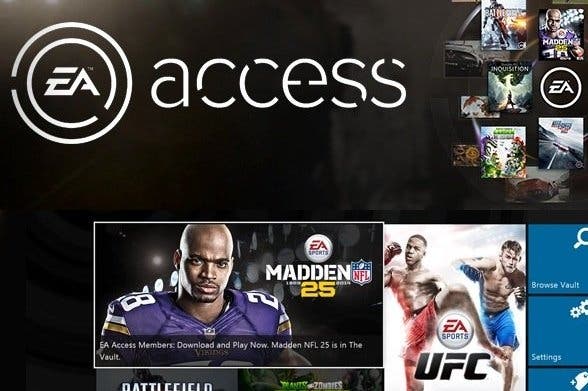Unsubscribe?
EA's Access service is good value, despite what Sony says - but it's still a less than ideal solution.
I actually felt kind of sorry for EA this week. Well, as sorry as you can feel for a faceless corporation that's got an annoying habit of trying to anthropomorphise itself, like some yuppie Pinocchio who wants so desperately, desperately hard to be loved. Still, EA comes in for some unfair stick, like it did following the announcement of EA Access, the Netflix-like subscription service that offers up a selection of the publisher's games for a slim subscription.
The first thing worth pointing out is that, whatever your misgivings, EA Access is tremendous value. In theory it is, at least - for £3.99 a month, or £19.99 a year, you're given a fairly generous selection of EA's titles, as well as early access to all-new games (which, in an older, simpler world we'd call a demo).
If the first batch is indicative of what's to come it's a potentially great service, even if it is eventually restricted to slightly older games whose value at your local trade-in store is quickly diminishing. The beta offers a handsome selection, complete with FIFA 14, Battlefield 4 and the latest Madden. And you know what, they're all good games. It might not be fashionable to admit it but, on console at least, EA has met an impressive threshold of quality in recent years.

I'm serious - stop snickering. FIFA is consistently good, and quite often great, and for all of its early troubles I still keep returning to Battlefield 4, which for me is the contemporary console shooter of choice - at least, that is, until Destiny arrives. I'd even go as far to say I've often loved DICE's shooter, and were I not already invested its inclusion would be enough to make me sign on the dotted line for Access.
So why the negativity? There's rightful resistance to the idea of games as a service, especially given how, in EA's case, expectations for how good that service will be are set low. There's concern, too, about the erosion of ownership, about not being able to call something your own and risking it being taking away from you whenever the servers are inevitably switched off. It's a sentiment felt in full-force when Microsoft laid out its early plans for the Xbox One, and regardless of what's happened since the feeling remains. Still, it's part of the new future of media we're all becoming resigned to, and it's not wholly exclusive to games. It's where you own nothing, but where companies go out of their way to own a little piece of you - a Facebook like, a Twitter follow or, in this case, being part of your monthly roll-call of direct debit orders.
Valid points all, and enough to excuse the grass-roots grumbling, but for Sony to join in is eye-opening. Its questioning of the value of the service was an unconvincing diversion - surely it's up to the customers to decide what is and what isn't good value, and besides, there are doubtless plenty of other reasons Sony would rather EA Access was kept away from the PlayStation ecosystem. For one it'd sit uncomfortably with Sony's own PlayStation Plus, of course, and for another it'd set a dangerous precedent. If EA's given the go-ahead, what's stopping Ubisoft and Activision joining in with their own paid-for subscription services?
It's a concern I have myself. I have subscriptions galore, but they're neatly compartmentalised: to Sky for my TV and sports package at home, to Spotify for music and to Netflix for films at home. Already, though, the games subscriptions are becoming a tangle - MMO fees get caught up amidst annual outgoings to Microsoft and Sony, and the idea of yet more getting involved in the mix isn't a particularly welcome one. It's a potential mess, and a pretty expensive one to boot.

It cuts through to another problem with EA Access. Netflix works because it is largely agnostic when it comes to studios - it's a fairly broad church with offerings from across the board, even if the selection of films too often feels like it belongs on a garage forecourt. Spotify, too, gives access to a fairly wide world of music for a single monthly fee, and my television subscription, despite admittedly being appended with a couple of bolt-ons, opens up a staggeringly vast world of entertainment.
The idea of signing up to invest in a publisher, however, seems like a slightly strange misreading of where brand loyalties lie. Surely it's the games, rather than the publisher, that people really care about? You can't blame EA, really, for extending part of a phenomenon that's strangely unique to games, where people treat corporations with beatific loyalty. You see it condensed into its most toxic in the spats that keep console wars raging, and it's present in subtler but no less poisonous terms at E3 conferences where corporations patronise the audience by calling them fans. I love FIFA and I love Battlefield, but I can't hand on heart say I love EA - just as don't think I could ever admit a real passion for any publisher, no matter how well they're doing their job.
So EA Access is good value, despite what Sony says. Whether it's a satisfactory solution, and a long-term proposition that can be a viable alternative to the Netflix and Spotify is another matter entirely.



-3-31-23-screenshot.png?width=291&height=164&fit=crop&quality=80&format=jpg&auto=webp)





